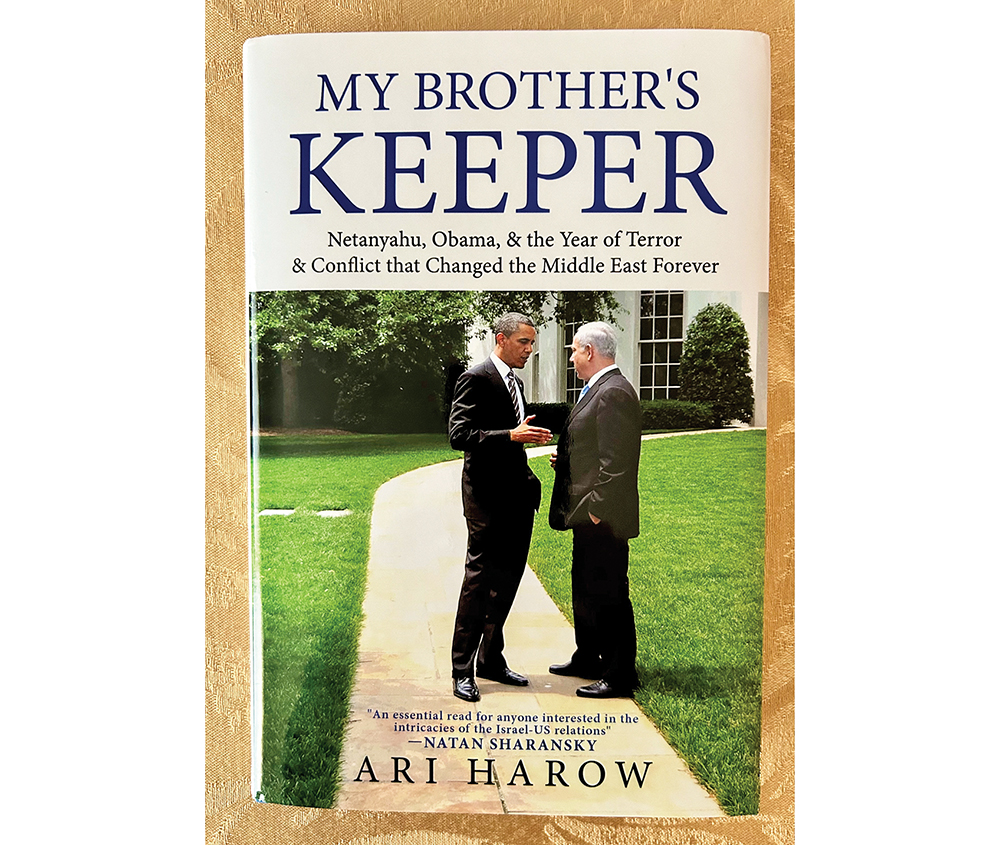
Reviewing: “My Brother’s Keeper: Netanyahu, Obama, & the Year of Terror & Conflict that Changed the Middle East Forever,” By Ari Harow. Bombardier Books/Post Hill Press. 2024. 304 pages. ISBN-13: 979-8888450130.
Ari Harow, former chief of staff and bureau chief under Israeli Prime Minister Benjamin Netanyahu during the turbulent years of the Obama administration, in his new book, “My Brother’s Keeper: Netanyahu, Obama, & the Year of Terror & Conflict that Changed the Middle East Forever,” has written an excellent insider’s account on the challenges facing Israel during those years.
This eminently readable, detailed and thoughtful narrative of the difficult relations between the Obama administration and the Netanyahu government provides the reader with essential grounding in many issues that continue to bedevil relations between Israel and the United States today.

“My Brother’s Keeper” is also very helpful in offering a thoughtful perspective on the leadership style and outlook of Netanyahu, now the longest-serving Israeli prime minister in the history of the Jewish state. In one early passage in the book (Pages 44-45), Harow shares:
Like Ron Dermer and others before him, I was precisely the kind of Israeli that Netanyahu wanted for his inner circle: young, Anglo and Orthodox. Netanyahu was not religious, but he believed that in the intersecting world of Israeli politics, where religion was always a component, faith was a great test for unconditional obedience … in the elastic world of Israeli political fealty, there was nothing more important than being able to trust those around you. Netanyahu preferred native English speakers—Brits, Australians, Canadians, but primarily Americans—to work with him and for him. Netanyahu was an anomaly in Israeli politics—the Jewish state’s first truly American prime minister.
Much of the book, though, is focused on the frequent friction between Obama and Netanyahu, which started when they met shortly after Obama won his first term. As Harow tells it (Page 35), Obama instructed his Israeli counterpart at that May 2009 meeting that he wanted a total building freeze in Judea and Samaria and used the phrase “not one brick” to emphasize his point.
Harow recounts (Pages 79-80) a particularly difficult meeting between Netanyahu and Obama in the White House in March 2010:
Obama showed little patience for his Israeli guest during his visit. The president’s disappointment that there was no movement when it came to the Palestinians was tangible. … The president gave Netanyahu thirteen demands, including that work immediately cease on the East Jerusalem apartment project. When Netanyahu stalled, Obama got up and simply said, ‘I’m going to have dinner with Michelle and the girls.’ He retreated to the residential wing, leaving his Israeli guests alone in the Roosevelt Room. Everyone in Netanyahu’s contingent was speechless, dumbfounded by this gesture. It was as if Obama was itching to roll up his sleeves and challenge Netanyahu to a fight. As the Israeli prime minister, Ambassador Oren, and the contingent waited, wondering what happened, Obama was putting his daughters to bed. Upon learning of the antics, one Israeli commentator described what happened as ‘swinish contempt.’
The heart of the book, and the source of its title, is a highly informed description of the kidnapping of three young Israeli boys—Gilad Shaar, Naftali Fraenkel and Eyal Yifrach—in Gush Etzion in June 2014 by two Hamas terrorists, and the 18-day search for the boys by the Israeli army and security services. This search ultimately concluded in the discovery of their bodies in a shallow grave in an area known as Hirbat Arnev, near the settlement of Karmei Tzur.
Though this detailed passage recounts an episode that is nearly 10 years old, the account is quite heartrending and gives the reader a broad view of an episode that unified the Israeli public in grief and deeply impacted their perception of the perils of this neighborhood.
The book clearly conveys Harow’s appreciation for his former boss, his admiration of the decisions Netanyahu made, and his gratitude for the opportunity to serve in this capacity.
Speaking of his role as chief of staff, Harow told The Jewish Link: “Every day in the Prime Minister’s Office is fraught with life-and-death dilemmas, critical decisions and far-reaching consequences. The chief of staff weighs in on most if not all of these discussions. Another part of it is helping the prime minister through his thoughts and dilemmas.”
Harow’s sense of hakarat hatov for this opportunity to serve is all the more remarkable because, as he shares in an author’s note at the front of the book, after he stepped down from the role of chief of staff he was subjected to a series of police investigations into his sale of his consulting firm. The inquiries lasted 20 months and “put great coercion on me and my family.” These investigations led Harow to accept a plea bargain agreement that he intimates was unjust and the result of a politically motivated process.
Harow is a well informed, thoughtful observer on the Israeli political scene, who draws on his experiences as he surveys current events and speaks frankly.
Speaking to The Jewish Link, he commented: “While I believe that Israel is in need of certain judicial reform, the divide within the country prior to October 7 brought the country to a dangerous place. Prime Minister Netanyahu had the opportunity to lower the flames of conflict and division and missed it.”
In comments elsewhere, Harow asserted that the intelligence failures that led to the October 7 Hamas massacre “must result in a complete change in Israeli leadership—including in the prime minister’s office.”
Harow’s book, “My Brother’s Keeper,” is an exceptional resource for anyone who wants a deeper understanding of recent Israeli history and the great tensions in the U.S.-Israel alliance during the Obama administration. I recommend it enthusiastically.
Harry Glazer is the Middlesex County Editor of The Jewish Link. He can be reached at [email protected]. He knows that two of his most faithful readers are his brother, Daniel Glazer, and his friend Rabbi Leon Glaser; he is grateful for their attention to his news stories.












